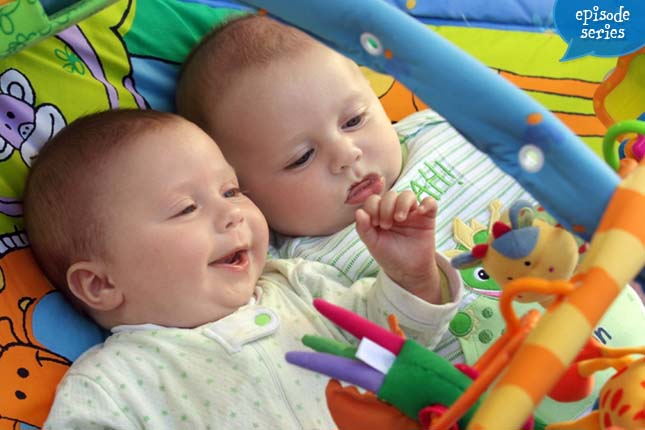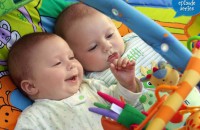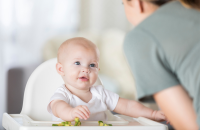Twin Talks
Twin Developmental Milestones: Social and Emotional
[00:00:00]
Please be advised, this transcription was performed from a company independent of New Mommy Media, LLC. As such, translation was required which may alter the accuracy of the transcription.
[Theme Music]
SUNNY GAULT: Twins experience social dynamics together that are unique compared to singletons. Sometimes to observers they may appear advanced in their social skills and ability to communicate with one another. But when we look at each twin individually, how do we know if he or she is experiencing appropriate social and emotional development overall. Today we’re talking social and emotional development of twins. This is Twin Talks
[Theme Music/Intro]
SUNNY GAULT: Welcome to Twin talks, broadcasting from the birth education centre of San Diego. Twin Talks is your weekly online on the go support group for expecting and new parents of twins. I’m Sunny Gault, I’m sitting in as host for today. Have you heard about the Twin Talks club? Our members get bonus content after each new show, plus special giveaways and discounts. Subscribe to our Twin Talks newsletter and learn about the latest episodes available. Another way for you to stay connected is by downloading our free Twin Talks app which is available in the Android and iTunes marketplace.
[Theme Music]
SUNNY GAULT: Alright we have a question from one of our listeners. This is from Kelly Marie and she posted this on our Facebook page. And we went back and forth a little bit on our Facebok page so just to get you guys kind of up to speed. Kelly Marie says: what is the earliest age twins can be born at. And we responded by saying twenty four weeks is considered a critical point of viability.
With about a fifty percent survival rate depending on, you know where you give birth. And we have had some panellist on our shows that have had twenty four weekers and their children are completely healthy. So, Kelly followed up and said, right now she’s in the hospital. She’s been in the hospital for almost four weeks. She says her cervix is a little short and she is twenty six weeks and four days pregnant. And they’re telling her that they want to keep her in the hospital at least until twenty eight weeks. And she wants to know why that is. So, we’re referring to our experts for the follow up on that
DOCTOR RICH: Hi Kelly my name is Doctor Rich I’m one with the San Diego pare natal centre and thanks for your question. The answer to your question is that moms who stay pregnant till twenty eight weeks have a much higher chance for survival and for what we call intact survival which means survival without long term problems. Like some of these panellist who’ve had even with their twenty four weekers.
Every week that you stay pregnant between twenty four and twenty eight highly increases the chance that a baby’s going to be born alive. Who’s going to live and survive and is going to survive without long term issues. And it’s especially important for twins because each baby has to make it through those statistics on their own. They don’t, having twins doesn’t increase their maturity necessarily. Thanks a lot
[Theme Music]
SUNNY GAULT: Today we’re continuing our series on twin developmental milestones. And today, we’re talking about the social and emotional development for twins. We’re talking with twin expert Joan A. Friedman, she’s a psychotherapist. And she’s also the author of two books. One is called Emotionally Healthy Twins: A New Philosophy and the other book is the same but different How Twins Can Live, Love and Learn to be Individuals. And we’ll put links to those books up on our website. Doctor Friedman is also the mother of twins and she also happens to be a twin herself.
So let’s face it, she knows a lot about twins. Doctor Friedman is joining us via phone to talk about what we should look for in healthy development. Doctor Friedman in your books when you talk about social and emotional development of twins, you talk about it not just from a twin to twin perspective but you also talk about the importance of a parent twin attachment. And how that can shape and motivate our social or twin social and emotional development
DOCTOR JOANE A. FRIEDMAN: That’s going to be so helpful because if twins never socially, academically or emotionally or they ever not on their own, how can they be expected as adolescents or young adults to really cope? It’s a fascinating and people just don’t think about it until it’s too late
SUNNY GAULT: Do you think that parents who have twins as well as singletons, especially if they have the singletons before the twins, do they have a tendency to deal with this a little bit differently since they have the experience of treating children as individuals? Do you think they recognize that?
DOCTOR JOANE A. FRIEDMAN: Absolutely. Because I had three singletons before I had my twins
SUNNY GAULT: Okay
DOCTOR JOANE A. FRIEDMAN: And once you’re, you know, if with new parents, it’s so much harder. But if you’re a seasoned parent, you’ve already seen your singletons go through, you know certain developmental sequences right? And you know about sleeping and feeding and eating and separating and going to preschool. So, I think you know that makes a lot easier to think that your twins are going to be resilient. Because you’ve seen your older children be resilient and get through things. And also, you know being a first time parent is practically the worst thing in the world right? You have no idea of what you’re doing. You’re anxious. You’re always feeling like you’re doing stuff wrong. You’re always worried. And that’s why it’s, you know the first kid is like kind of messed up so much because parents are so nervous. So, yes I do feel that if you, if you’re lucky enough to have twins after you’ve had singletons your way ahead of the [inaudible] but unfortunately it’s often not true, because the people having twins now are the women that have waited and that you know they had careers and they’re having children later and maybe they have to resort to IVF and maybe these are going to be their only children. And so, to completely different mentality
SUNNY GAULT: Do you find that twins have more advantage or disadvantage over time when it comes to their social development compared to singletons
DOCTOR JOANE A. FRIEDMAN: Well, the issue is when they’re young
SUNNY GAULT: Okay
DOCTOR JOANE A. FRIEDMAN: You know twins get a lot of attention. And so people kind of gravitate towards them. They were always like “oh, you’re a twin, what’s your name” blah, you know so, so in some way to social piece might be a little bit easier in terms of them. But this, if they’re in separate classes let’s say and people could not figure out who they are or they’re called different names if one has is invited to a birthday party and the other one isn’t. That’s when you have to start dealing with some of the social difficulties. If one has a best friend and the other one doesn’t. Or you know, play dates with three never work. And so there’s a lot of, there’s a positive but there’s also negative if you’re or challenges if you’re trying to socialize your twins into having separate experiences and his twin is not, not going to be involved. Like you know with our twins you know one is was your temperaments much more sociable and one was shyer and so there’s certainly were difficulties in terms of their big differences in terms of their social lives and being invited here or there or number of friends. It’s just, it’s really a question of helping them accept who they are. And the choices they make, and again, trying hard not to compare them. But try to really see them as singletons even though they’re twins. They were born of the same time and they have a lot of similarities they’re still very different people. And I think you’ll have an easier time because you had other children. But I think when twins are your first kids, it’s a very hard thing to do. But it’s very possible if you focus on it
SUNNY GAULT: You know you mentioned the possibility of people and this happens, I have identical, so this happens quite a bit with us already. But people mixing up your children and I would imagine for the twins that really do look alike more and more perhaps as they get older. That could really, you know, sometimes I get frustrated. I feel like I have a very unique name. When people can’t remember my name, I’m like, really? You can’t remember my name? So I can imagine as a twin, you know what I mean. If someone is looking right at you and can’t, doesn’t know exactly who you are, I would imagine that could really mess with you emotionally and perhaps socially as well right?
DOCTOR JOANE A. FRIEDMAN: Well yeah it does, you know, like when my sister, of course her name is Jane right because were identical twins. You know when we grew up, I mean nobody knew who we were except that you know I had a dimple and I was three minutes older. And it’s very frustrating, I mean you know the, it’s like on one hand you get a lot of attention and everyone knows you. But as you get older and I talk about this in my book, Emotionally Healthy Twins, you don’t want to be noticed, you want to be known. You want to be known for who you are for yourself. And you know unless parents really help twins have that happen, you’re not, no one ever really does know you. And in fact, you don’t really even know yourself. Until you’re finally kind of physically separated from your twins and forced to be on your own and forced to have your own kind of individual experiences. But you’re absolutely right, and so you know, and I know you’re going to be a parent like this, you’re going to dress them differently or maybe have ways that other people can differentiate who’s who. Because it’s very frustrating for twins especially if they get older to have people confuse them all the time. It is, it does mess with you
SUNNY GAULT: Yes. Is it, I, for my girls they have different earrings. I got their ears pierced. So they may, they may be wearing the same outfit but I said, look at, look at for the earrings
DOCTOR JOANE A. FRIEDMAN: Well that’s good. I mean there’s just got to be something, you know like haircut, earrings, the colour of shoes. You know, birth marks, something. And you know and again it’s just one of those things that you have to, you have to help everyone in your family and everyone else to help differentiate them. And it’s tiring sometimes
SUNNY GAULT: I know. It is
DOCTOR JOANE A. FRIEDMAN: Yeah, it is but it’s important and pretty soon when, as they get older they’ll tell people. No, I’m not so and so, I’m so and so with indignity
SUNNY GAULT: Right exactly, I’m waiting for that one. Alright when we come back we’ll talk about how these advantages and disadvantages may appear different ages and stages of development. We’ll be right back
[Theme Music]
SUNNY GAULT: Welcome back, today we’re talking with Doctor Joan A. Friedman about social and emotional development in twins. So Doctor Friedman we talked about some of the advantages and disadvantages that may appear with twins, how do some of these advantages and disadvantages appear at ages or periods of development. What can you tell us about that?
DOCTOR JOANE A. FRIEDMAN: Well I know that the twins who have been separated appropriately you know, during their lifetime, you know, when they get to college or when they have to make a decision about college they are able to say, well I’d like to go here and I don’t want to go to the same school that you go to. Let’s think about choosing different colleges. They already, you know at a state where they are accustomed to having individual choices and having that appreciated and recognized. It’s also when you know lots of times when twins don’t have that advantage of feeling individuated and differentiated they can’t really make decisions for themselves because they’re so concerned that their decisions are going to impact their brother or sister. Like this is a, this is the most common call I get which is, Hi Doctor Friedman, I’m so and so. I’m so upset, can you help me? I’m in a relationship. My twin sister or twin brother is not in a relationship, I feel so guilty and so bad that my sister is not happy and I’m happy. And I can’t enjoy my own happiness because my sister is upset because she doesn’t have what I have. Now this happens so often that people are always so surprised because they can’t understand how one person’s happiness could impact another so profoundly. I mean if you think about siblings, you know siblings can, they’re competitive, you know they have different skills or you know different you know great or different social situation but they kind of expect competitiveness in its sort of built-in to their relationship.
People often think that twins can’t and shouldn’t be competitive. And so, and they’re oftentimes uncomfortable with it especially the identical twins. And so I often get this conundrum about how do I feel good about myself when I know sister or brother is suffering and doesn’t feel good about himself. And that really does show that there’s been a lack of individuation growing up. It’s because it’s like, it’s not okay what I want, what I feel and what I need because all of those things are impacting negatively on my twins. And this is what I see mostly in young adult twins. I mean it usually it resolves overtime you know with talking and therapy and communication. But the funny thing is Sunny is that people always feel that twins are these amazingly intimate communicators. The issue is they’re intimate because they’ve shared space you know, for usually for eighteen years. But they’re not intimate in a way that they can talk to one another about issues. That’s, it’s kind of like when you have a twin issue and they come into counselling. It’s almost like they’re doing couples counseling. Because they’ve never really talked to one another about what they really feel or really want.
It’s always been about keeping the balance and keeping it equilibrium, but not really talking freely about how they are impacting one another or how they might be disagreeing, or how they’re not getting along. It really needs to show to everybody that they’re best friends. This is why I get so upset, you know, because, why do we insist on them being best of friends? If we insist on that then in precludes them from, you know, doing other things or feeling other ways. Like I was talking to a mom, her twins are fourteen. And she said they used to be best friends and now one of them started to have a girlfriend and now all hell’s broken loose. And she is a mom, felt like a failure because her twins were no longer best friends. So I think sometimes, parents feel that they’re doing a great job if that’s what the end result is rather than feeling as if that putting a pressure on them that really in the long run can be a disadvantage
SUNNY GAULT: You’re right that is a lot of pressure we’re putting on them. And I wonder and this is a fair comparison but I wonder if we whether we’re parents of twins or you know we’re just people who know a set of twins especially they look a lot alike, we feel like they’re kind of one person. I mean at one point, you know identicals were one egg or one cell. And they divided right? So I feel like we do, we put this undo pressure because we’re kind of seeing similar features. And it’s kind of like we lump them in two, well that’s like being at war with yourself. You like yourself for most people you know, one, you know say that they don’t like themselves or they, you know what I mean. So, you know I think that’s kind of where that comes from even though that’s not fair because they are individuals. But I feel like that’s kind of what we see. We’re letting the visual kind of take over there I think a little too much
DOCTOR JOANE A. FRIEDMAN: Yeah and also you know it’s funny because many twins are best friends I mean it’s certainly not, it’s not unusual. But mainly for the twins that aren’t best friends or don’t want to be best friends like, they need to have a voice or they need to have space or they need to have a life where that’s not part of the expectation right. So, it’s so funny because you know people come up to me and they say “oh are you and Jane best friends?” and I said “no, you know, we’re sisters and we love each other. We live very close to one another. But we have our own best friends” and Sunny you should see their face.
When I tell them, they are angry and that is the end of the conversation. Because I have burst their bubble, how can that possibly be? And it’s, so it’s just something again to think about. And it’s just a societal cultural stereotype that gets projected on to twins all the time. And I’m sort of passionate about trying to break through a lot of those things. I often get criticized because people say “oh you’re bringing up all these negative things about being a twin and you know lots of twins have nothing negative” and I say “it’s not a question of negative. It’s just there are twins that are best friends and there are twins that aren’t. And you need a wider range to think about these things than just thinking and putting them all on a stereotypic box. That’s not fair” So, and that’s why, you know when I wrote the second book the same but different to people that find the book and get in touch with me “oh my God, thank you so much! Now I understand my twin relationship. I don’t feel so bad. I know that there are other twins that feel like me. I mean it’s such an enormous relief and it’s been so rewarding for me to be able to do that”
SUNNY GAULT: Now do you feel like there’s more comparisons made when, and then maybe fraternal twins but same sex or you know even identicals, do you feel like you know there’s, there’s more of that, you know expectation as opposed to fraternal that may be boy girl?
DOCTOR JOANE A. FRIEDMAN: Yeah. I think you know boy girl is kind of the easiest twinship to handle because they, you know, the twins they definitely differentiate according to their gender. You know, as time goes on so I think it’s easier, I mean if the funniest stories that I’ve heard is that often you know girls because they cognitively develop earlier are pretty bossy.
So they’re usually bossing these little twin boys around and they become really overly maternal. And I’ve had moms come up and say to me “oh well she’s always saying, my twin daughter saying about my twin son; don’t touch him, he’s okay, didn’t do anything wrong, you know I can help him, don’t you know take” and then you know I said to the mom you really have to sort of say “well you know thank you very much but I’m the mom here I’m in charge. I’ll decide whether or not to punish him but it’s you know, move over it’s my job” So I think that happens often and that’s, you know that’s often dynamic that they see in pre-school. When the boy and the girl are together they bring that dynamic to school and oftentimes you know the direct rule say when it’s appropriate maybe you should think about trying to separate them a little bit. Because the boys just underneath her, his sister’s thumb
SUNNY GAULT: Sure
DOCTOR JOANE A. FRIEDMAN: With identicals, it’s very hard. I think because everyone else wants them together. So, it’s a challenge for them because they’re trying to differentiate and it’s a bigger challenge everyone else is seeing them as a unit too. Fraternal twins, it’s interesting. They’re usually not, some look very much alike but they’re usually, you know different. I think the hardest thing with fraternal twins is, you know if one is, you know like very bright and the other one might be slower or one is more athletic and one’s not or one’s you know. Like with mine Johnny and David. You know, David had some intrauterine growth retardation so he was always smaller that Johnny. So the comparison all the time, like how can you be twins? You’re so much smaller. You know that kind of stuff can be very hard for fraternal twins. And that has to be handled really with a lot of skill, because the comparison just, because all people need to do is hear the word twins, whether it’s fraternal or identical, a boy and girl. All they do is hear it and they make assumptions and you know if you’re fraternal twins and your ones smaller and one’s bigger, your twins? How can you be twins? You know it just happens all the time. So that can be a challenge with fraternal twins and a lot of overt differences that people are commenting on all the time
SUNNY GAULT: Well then, and again that’s putting pressure on them like “oh I’m not doing what I’m supposed to be doing” when really they have no control over that stuff.
DOCTOR JOANE A. FRIEDMAN: No, you don’t have any control. And you know if a singleton is born small, it’s not the same because there’s no other same age sibling that you’re comparing him or her to. He’s just small
SUNNY GAULT: Right
DOCTOR JOANE A. FRIEDMAN: Or he’s athletic or he’s shy, or he’s not comfortable. But when you have two children born at the same time, it’s instant comparative situation and it’s very hard, hard enough for parents not to compare much less everybody else. You know it’s challenging
SUNNY GAULT: So what would you say some things are that parents can do to promote a healthy social-emotional development and also to encourage this individuality that we’re talking about
DOCTOR JOANE A. FRIEDMAN: Okay, you know the first thing I would say is to just take them out alone or spend alone time as early as you can. And really learn to appreciate the differences in their temperament and the differences in their personalities. To give them over time when you can age-appropriate separate experiences like you feel they can be separated when they go to kindergarten, go for it. If you feel they’re ready to go on separate play dates, go for it. If you feel you can send them to different day camps for a week when it’s appropriate, go for it. Try to think about or separate teams, whatever, you know, everyone’s family is completely different in terms of how they can manage this. Like one man said to me “I take one down to the trash with me when I go”? And that’s all you could manage. But that was okay. It’s thinking about how to deal with them on a one to one basis where they can be alone with you. And really, really understand the importance of the parent being the most important person and not the twins. That’s kind of my main message. And if you’re able to incorporate some of those things in their life, they’ll grow up feeling much more individuated and a lot less dependent on one another
SUNNY GAULT: That’s great advice, great advice. If parent’s think that their twins are developing maybe different especially if you can compare them to singletons or something like that, if they think that something is a little off. What advice would you have for them like when do you get an expert involved, which advice on that
DOCTOR JOANE A. FRIEDMAN: Well I know for such things are you know, sort of, you now occupational therapy and speech therapy and all that sort of stuff they always say that you know early intervention is the best. And I think you have to go to, you know, kind of a developmental paediatrician to talk to about those kinds of things. You know the emotional development is so different for each pair of twins and is often different for each family. Because every family has different expectations about how they think their twins are developing. Like people think my idea of all these separate stuff is crazy. And other people think “oh that sounds like a good idea, I’ll try to do it” And other people think “I can’t do it. I’m never going to separate my twins. It’s not good for them”. So it’s I can’t give like an advice like one size fits all because it’s such a personal decision. But I would say that usually teachers.
Teachers are the ones that will come and say maybe to a parent “you know what, I think your kids aren’t, they’re too attached. They’re not separating in school. They’re spending all their time together. It seems to be interfering with their capacity to make other friendships. Or they’re not, they’re not moving away from each other in a way that would maybe make them seem like they’re safe on an individual basis.
So I think usually those kinds of issues come across maybe when kids start pre-school or maybe even kindergarten where you might start to see that they’re not socially developing the way that singletons do. Again it’s not their fault. It’s just that they haven’t had any time really to sort of be on their own and to figure out what that’s like. So, again, I don’t know, I was trying to think to answer the question what would see in a young, in young twins or in infant twins that would give you a sense of the developments inappropriate.
I mean people say that twins speech develops slower. And that seems to be true because they have less, they have less adult intervention. But, that usually does resolve, you know overtime. One other factor I have read about and heard about from patients is there’s something called power of two. It’s when you have twins that are together and you put them in a situation in class and they’re very disruptive because they really haven’t learned to do anything except be responsive to each other. And they don’t really respond to authority and they don’t want to be separated and may become very disruptive. But that’s so obvious and it’s unusual, but it does happen. So, I don’t know, I just think you have to sort of take it, you know day by day. And if you feel that there’s something wrong or something’s not right, you have to ask a paediatrician or you could ask a psychotherapist who deals with twins. But I don’t actually see something really, you know, kind of flagrant in your face until maybe they’re out of the house more and they’re interacting with other children
SUNNY GAULT: Okay. But in the meantime encouraging that individuality whenever possible would probably be some good advice then for parents with the young kids
DOCTOR JOANE A. FRIEDMAN: Absolutely
SUNNY GAULT: Got it
DOCTOR JOANE A. FRIEDMAN: Right. And I think also, reading my book, the Emotionally Healthy Twins really showed a lot of light on what I talked about that. I think that really helps and it’s organized in the developmental way by chapters by ages. So, I think that can be a helpful resource too
SUNNY GAULT: Awesome. Okay Doctor Friedman, thank you so much for being part of our show today. I found the conversation enlightening and I’m so happy that you were able to be here with us
DOCTOR JOANE A. FRIEDMAN: Okay. Well thank you Sunny, I really appreciate of being able to share my perspectives and my philosophy. Thank you so much
SUNNY GAULT: Absolutely. For more information about twins social and emotional development or for more information about our expert, you can visit the episode page on our website. This conversation continues for members of our twin talks club. After the show, we’re going to talk a little bit more about encouraging social interaction with other children and your twins. Because that can be, like we mention a little bit earlier, that can be a little tough sometimes when your twins are exploring different friendships. So we’ll talk a little bit more about that just a bit. If you want more information about the twin talks club, you can visit our website www.newmommymedia.com
[Theme Music]
SUNNY GAULT: We have our annoying comments with twin moms section today and this one comes from Melissa in Texas. She says, I had a twelve year old, a seven year old, a three year old and eighteen month old identical sons. When people say I don’t know how do you do it. I usually respond with “I have a glass or two of wine before they all go to bed”. The most annoying comment I hear doesn’t come from a stranger though. Whenever my mother-in-law sees the twins, she always asks which is which. When I tell her, her response is always “are you sure?” Uh hello? I think I know my own children
[Theme Music]
SUNNY GAULT: That wraps up our show for today. We appreciate you listening to Twin Talks.
Don’t forget to check our sister shows:
• Preggie Pals for expecting parents
• The Boob Group for moms who breastfeed their babies
• Parent Savers, your parenting resource on the go.
This is Twin Talks, parenting times two or times two, times two. However many you have.
[Disclaimer]
This has been a New Mommy Media production. Information and material contained in this episode are presented for educational purposes only. Statements and opinions expressed in this episode are not necessarily those of New Mommy Media and should not be considered facts. Though information in which areas are related to be accurate, it is not intended to replace or substitute for professional, Medical or advisor care and should not be used for diagnosing or treating health care problem or disease or prescribing any medications. If you have questions or concerns regarding your physical or mental health or the health of your baby, please seek assistance from a qualified health care provider.
SUNNY GAULT: New Mommy Media is expanding our line up of shows for new and expecting parents. If you have an idea for a new series or if you’re a business or organization interested in joining our network of shows through a co-branded podcast, visit www.NewMommyMedia.com
[00:32:00]
[End of Audio]












